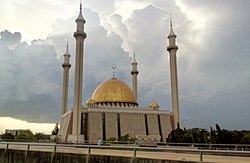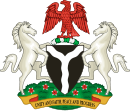
Back الإسلام في نيجيريا Arabic Islam au Nigeria French Musulunci a Najeriya Hausa Islam di Nigeria ID Islam di Nigeria Malay Islam in Nigeria Dutch Islamismo na Nigéria Portuguese Ислам в Нигерии Russian Islam in Nigeria SIMPLE Uislamu nchini Nigeria Swahili
The examples and perspective in this article may not include all significant viewpoints. (May 2014) |
 Abuja National Mosque, the national mosque of Nigeria | |
| Total population | |
|---|---|
53.5% of the population. |
| This article is part of a series in |
| Culture of Nigeria |
|---|
 |
| Islam by country |
|---|
 |
|
|
Islam is one of the two largest religions in Nigeria. Nigeria also has the largest Muslim population in Africa.[1]In 2024, Nigeria had the largest Muslim population in Africa, with around 105 million people who belonged to an Islamic denomination.[2][3] Islam is predominantly concentrated in the northern half of the country, with a significant Muslim minority existing in the southern region.[4] Most of Northern Nigeria is governed under Sharia law, while the rest of the country is governed under secular law.[5]
Merchants from North Africa and the Senegalese basin introduced Islam to what is now Nigeria during the 11th century, and it was the first monotheistic Abrahamic religion to arrive in Nigeria. The northern half of Nigeria was historically under the rule of various Islamic states and empires such as the Kanem–Bornu Empire, the Mali Empire, the Songhai Empire, and the Hausa Kingdoms. The Sokoto Caliphate, founded by Fulani Islamic scholar Usman dan Fodio, dominated northern Nigeria throughout the 19th century during the Fula jihads, until it was annexed by the British Empire in 1903. Portuguese missionaries introduced Christianity to the southern half of Nigeria during the 15th century, and it grew to be a dominant religion in Nigeria alongside Islam during British colonial rule beginning in the late 19th century.
Muslims in Nigeria are predominantly Sunnis of the Maliki school of thought. However, there is a significant Shia minority, primarily in Kaduna, Kano, Katsina, Osun, Kwara, Yobe and Sokoto states (see Shia in Nigeria). In particular, A 2008 Pew Forum survey on religious diversity identified 5% of Nigerian Muslims as Shia.[6] The Ahmadiyya movement also has a sizeable presence in the country.[7]
- ^ Region: Sub-Saharan Africa. Pew Research Center's Religion & Public Life Project (Report). 27 January 2011. ISBN 978-202-419-4347. Archived from the original on 4 April 2019. Retrieved 15 January 2021.
- ^ "Africa: Muslim population by country 2024". Statista. Retrieved 2024-08-31.
- ^ "The World Factbook — Central Intelligence Agency". www.cia.gov. Archived from the original on 9 January 2021. Retrieved 10 April 2018.
- ^ "Islam in Nigeria". 15 November 2002. Archived from the original on 4 December 2021. Retrieved 4 December 2021.
- ^ "Sharia implementation in northern Nigeria after 15 years | Oxford Department of International Development". www.qeh.ox.ac.uk. Archived from the original on 2023-04-06. Retrieved 2023-03-24.
- ^ "The World's Muslims: Unity and Diversity". Pew Forum on Religious & Public life. August 9, 2012. Archived from the original on March 10, 2019. Retrieved August 14, 2012.
- ^ "Achievements of Ahmadiyya Muslim Jamaat in Nigeria